You’ll need to budget for seven essential startup costs when launching your jewelry making business. Tool investments range from $500-$1,500, while raw materials and inventory typically cost $3,000-$10,000. Workshop space setup can vary from $600-$16,000 depending on your location choice. Business registration and legal requirements cost $500-$1,500, with website development adding $2,000-$8,000. Marketing budgets should represent 10-15% of total costs, while insurance and safety equipment require $850-$4,150. Understanding these categories will help you plan your successful venture.
Essential Tools and Equipment Investment
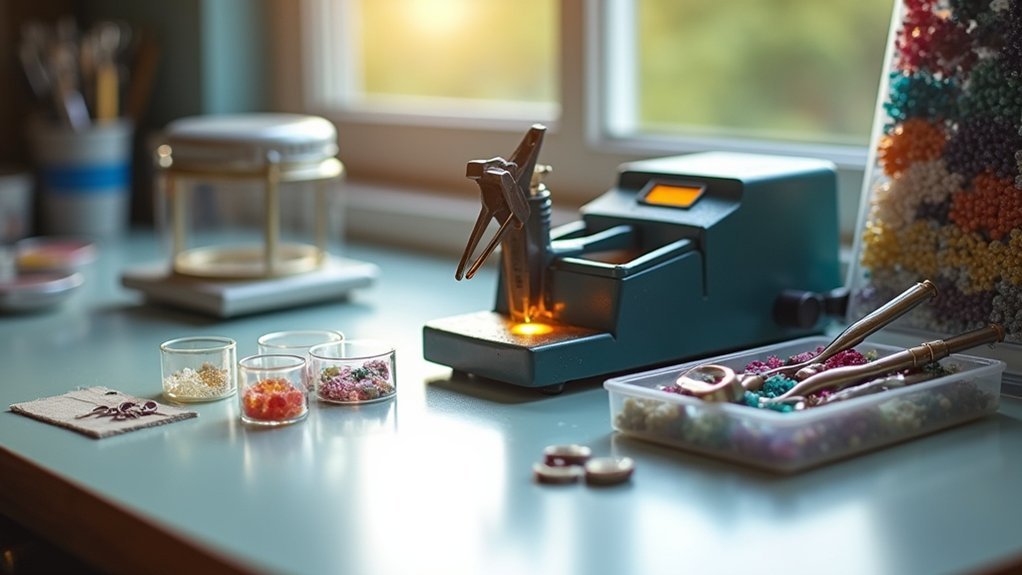
Starting a jewelry-making business requires a strategic approach to tool and equipment purchases, as your initial investment will directly impact both your production capabilities and overall startup costs.
Your initial tool investment determines both production quality and startup costs, making strategic equipment purchases essential for jewelry business success.
You’ll need essential tools ranging from $500 to $1,500, including pliers, saws, and files for crafting high-quality materials into finished pieces. A jeweler’s bench ($200-$1,000) provides your dedicated workspace, while polishing machines ($150-$600) guarantee professional-grade finishes.
Don’t overlook safety equipment—protective eyewear and gloves cost $50-$150 but they’re vital for maintaining a secure work environment.
As a business owner, you might also invest in specialized tools like metal stamping kits ($30-$100) depending on your jewelry-making techniques and target market demands.
Raw Materials and Inventory Sourcing
Building your jewelry inventory requires a substantial financial commitment, as raw materials and initial stock typically consume $3,000 to $10,000 of your startup budget—representing 20-30% of your total investment.
Your initial inventory should prioritize ethically sourced metals and gemstones, allocating $2,000 to $8,000 for diverse selections. High-quality materials can account for up to 60% of startup costs, making supplier relationships essential for consistent quality and pricing.
| Material Type | Budget Range | Quality Focus |
|---|---|---|
| Precious Metals | $1,500-$4,000 | Ethically sourced gold/silver |
| Gemstones | $800-$2,500 | Certified natural stones |
| Findings/Components | $300-$800 | Durable clasps/settings |
| Packaging Materials | $200-$500 | Sustainable options |
| Display Inventory | $400-$1,200 | Professional presentation |
Investing in sustainable, ethically sourced materials strengthens your brand identity while appealing to conscious consumers seeking responsible jewelry options.
Workshop Space and Rental Expenses
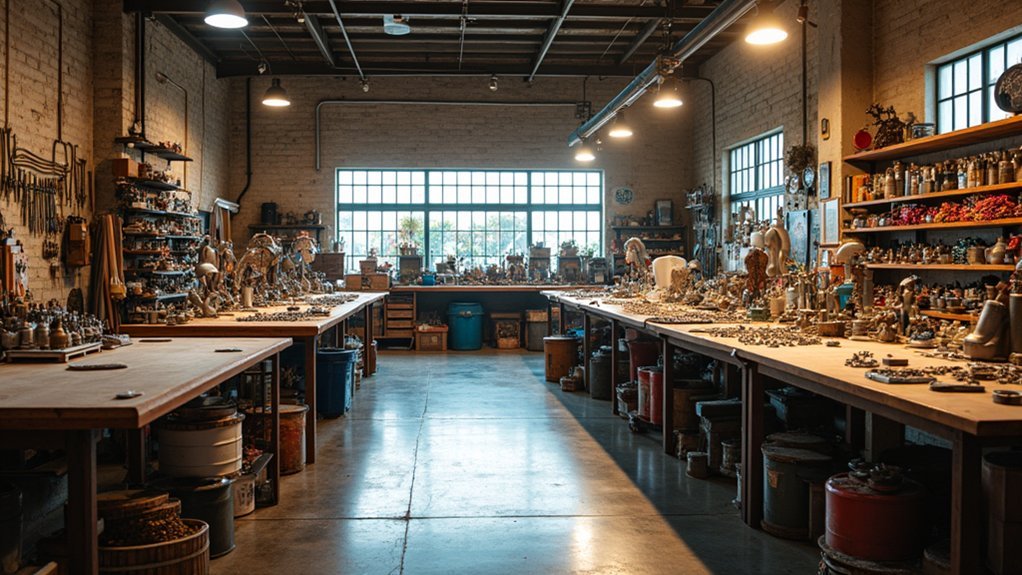
You’ll need to decide between setting up a home workshop or renting commercial space, as this choice greatly impacts your startup budget.
A home setup can keep your initial costs between $600 and $16,000, while commercial rental spaces typically run $800 to $5,000 monthly plus additional expenses.
Consider that commercial spaces often require security deposits of one to three months’ rent upfront, along with specialized renovation costs for proper lighting and ventilation.
Home Workshop Setup
The foundation of any successful jewelry making business begins with establishing a well-equipped workspace that balances functionality with cost-effectiveness.
Your home workshop setup costs can range from $600 to $16,000, depending on your operational scale. Essential items include a quality jeweler’s bench ($200-$1,000) and basic tools and materials like pliers and saws ($500-$1,500).
You’ll need to budget for safety equipment ($50-$150) to protect yourself while working. Renovation costs for proper lighting and ventilation modifications typically range from $3,000 to $8,000.
Material costs vary based on your jewelry types, but starting from home minimizes overhead compared to renting dedicated workspace, which adds $800-$5,000 monthly expenses.
Commercial Space Rental
As your jewelry making business grows beyond home production capabilities, commercial space rental becomes a necessary investment that greatly impacts your monthly overhead. You’ll face startup costs ranging from $800 to $5,000 monthly for workshop space, plus utilities adding $200 to $1,000. Renovation costs for specialized lighting and ventilation typically run $3,000 to $8,000.
| Expense Category | Cost Range |
|---|---|
| Monthly Rent | $800 – $5,000 |
| Utilities | $200 – $1,000 |
| Renovation Costs | $3,000 – $8,000 |
| Security Deposit | 1-3 months’ rent |
| High Foot Traffic Premium | 20-50% more |
Lease agreements require deposits equaling 1-3 months’ rent upfront. While high foot traffic locations cost more, they offer retail potential for your jewelry-making business.
Business Registration and Legal Requirements
You’ll need to choose your business structure carefully, as it affects both your startup costs and ongoing legal obligations.
Your jewelry business requires specific licenses and permits that vary by location, so research your local requirements thoroughly.
Don’t forget to budget for legal protection costs, including potential attorney consultations and trademark registration for your brand.
Business Structure Selection
When launching your jewelry making business, selecting the appropriate business structure forms the foundation of your legal and financial protection. Your business structure selection directly impacts personal asset protection, with LLCs offering stronger safeguards than sole proprietorship options.
Business registration costs vary greatly, ranging from $500 to $1,500 depending on your location and whether you’ll need legal assistance.
Each structure presents different legal requirements and benefits. While sole proprietorships offer simplicity, LLCs provide better liability protection and potential tax advantages.
You’ll need to factor in ongoing compliance costs, including annual filings and fees that continue throughout your business’s lifecycle.
Consider consulting legal professionals during this process. Though it increases upfront expenses, proper guidance guarantees you meet industry regulations and avoid costly future liabilities that could jeopardize your jewelry business.
License and Permit Requirements
Beyond establishing your business structure, securing the proper licenses and permits represents a critical step that can’t be overlooked in your jewelry making venture.
Business registration and legal fees typically range from $500 to $1,500, depending on your chosen structure and location. You’ll need to research specific licenses and permits required in your state and municipality, as requirements vary greatly and directly impact your startup costs.
If you’ve formed an LLC, you may face additional legal assistance fees, but this protects your personal assets.
Ensuring compliance with local regulations prevents costly fines and operational disruptions that could derail your business before it starts. Proper registration legitimizes your venture and enhances credibility with customers and suppliers, contributing to long-term success.
Legal Protection Costs
Protecting your jewelry business legally requires careful attention to registration costs and compliance requirements that form the foundation of your venture.
You’ll face business registration costs ranging from $500 to $1,500, depending on your chosen structure and location. Beyond basic registration, licenses and permits add variable fees based on state and local regulations, increasing your initial setup costs considerably.
Don’t overlook legal assistance expenses when budgeting for startup. Professional help with contracts and terms of service can add several hundred dollars but provides essential legal protection.
While these costs might seem substantial initially, proper compliance prevents devastating consequences. Failing to meet legal requirements can trigger fines or operational halts that’ll cost far more than upfront investment.
Smart entrepreneurs prioritize legal foundations to build credibility with customers and suppliers.
Online Platform and Website Development
Since your jewelry business needs a strong digital presence to reach customers and generate sales, you’ll need to budget between $2,000 to $8,000 for setting up a thorough online platform with essential e-commerce features.
Website development costs range from $1,500 to $10,000 depending on customization complexity. Your initial investment should include hosting and domain registration fees of $100 to $500 annually, plus payment gateway integration costing $200 to $800.
A user-friendly website with appealing design can boost conversion rates by 30%, making usability important.
Don’t overlook digital security measures during setup—they’re essential for protecting customer information and ensuring safe transactions.
These components form the foundation of your online jewelry business success.
Marketing and Brand Development
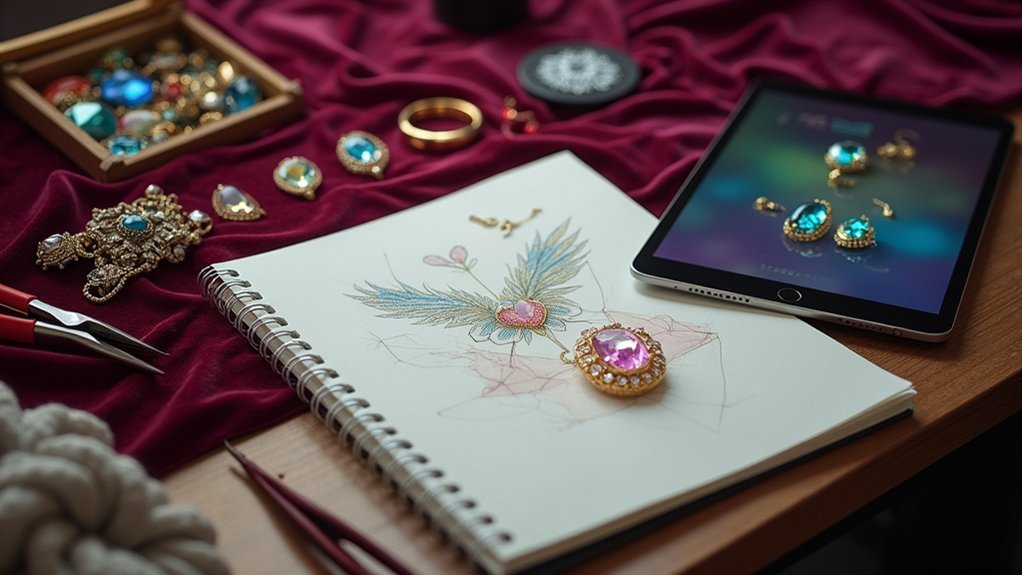
After establishing your online platform, you’ll need to allocate 10-15% of your overall budget—typically $1,500 to $7,500—for marketing and brand development initiatives. This investment covers essential marketing materials, online advertising campaigns, and establishing a strong brand identity that resonates with your target audience.
Focus on eco-conscious demographics to enhance your brand’s appeal and support sustainable growth. The costs involved include designing professional marketing materials, social media advertising, and content creation. Engaging with customers through workshops and interactive experiences strengthens your brand while building loyalty.
Your total startup investment in visual branding and user-friendly design can improve conversion rates by 30%.
Balance digital and traditional marketing channels to maximize reach and create memorable customer experiences that drive long-term success.
Insurance and Safety Equipment
While establishing your jewelry making business, you’ll need to budget $850 to $4,150 for insurance and safety equipment—essential investments that protect both your assets and well-being.
Business insurance typically costs $300 to $2,000 annually, providing vital asset protection. You should also secure liability insurance specifically for jewelry businesses, which runs $500 to $1,500 yearly to cover potential damages or theft.
Protect your jewelry business with comprehensive insurance coverage ranging from $800 to $3,500 annually for complete peace of mind.
Safety equipment forms another significant expense. Purchase quality protective eyewear and gloves for $50 to $150, depending on specifications.
Your workspace requires proper ventilation systems when handling chemicals, adding $500 to $2,000 to startup costs. Consider investing in safety training programs costing $100 to $500 to guarantee proper tool and material handling, enhancing compliance and reducing workplace risks.
Frequently Asked Questions
How Much Does It Cost to Start a Jewelry Making Business?
You’ll need $600 to $16,000 to start your jewelry making business. This covers business registration, tools, materials, website development, and marketing. Your exact costs depend on your chosen business model and scale.
What Is a Good Profit Margin for a Jewelry Business?
You should aim for profit margins between 42-60% in jewelry making. Fine jewelry typically achieves 50-60% margins, while handmade pieces vary based on craftsmanship. Luxury brands can reach 70% through effective pricing strategies.
How Much Can I Use to Start a Jewelry Business?
You can start a jewelry business with $600 to $30,000 depending on your model. Home-based operations need $600-$16,000, online stores require $3,000-$15,000, while retail locations cost $9,000-$30,000.
How Much Does It Cost to Start up a Permanent Jewelry Business?
You’ll need $3,000 to $15,000 to start your permanent jewelry business. This covers business registration, inventory, tools, website development, and initial marketing efforts to launch successfully.
In Summary
You’ve now identified the seven essential startup costs for your jewelry making business. By carefully planning for tools, materials, workspace, legal requirements, online presence, marketing, and insurance, you’ll set yourself up for success. Don’t rush into spending—prioritize what you need immediately and gradually build your inventory and equipment as your business grows. Start with quality basics and expand strategically as your customer base develops.

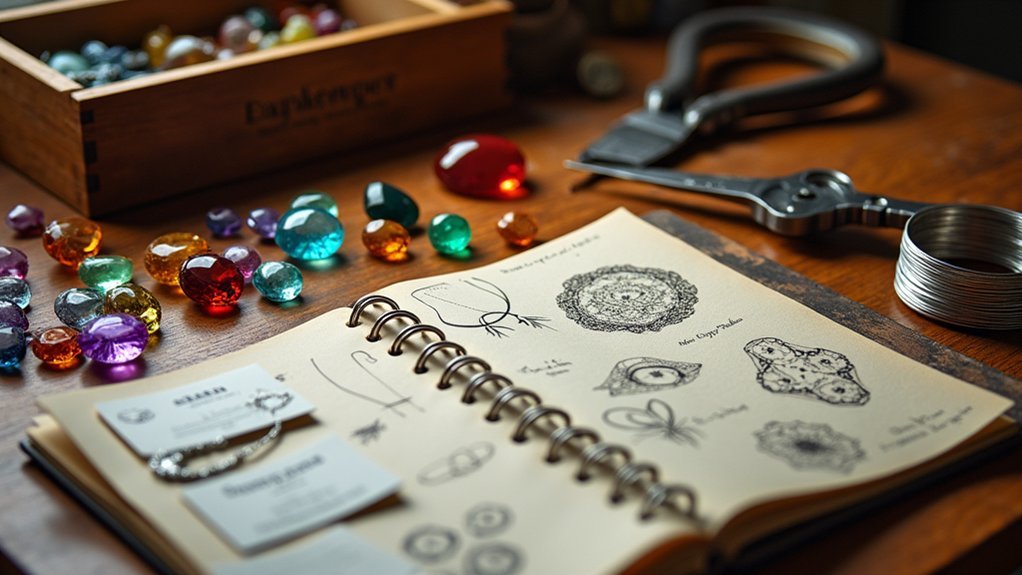

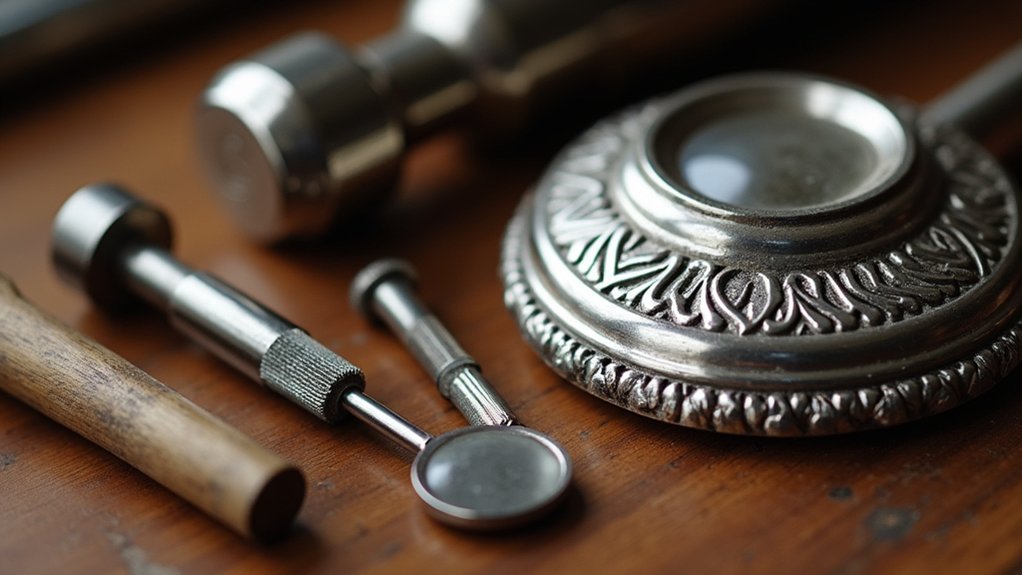

Leave a Reply